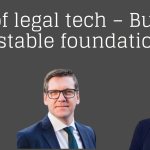Jeremy Coleman, former director of innovation at Norton Rose Fulbright, announced in July that he is moving to ContractPodAi as vice president of legal research and development. Here he talks to Legal IT Insider’s editor Caroline Hill about some of his incentives for joining, starting with the people, including senior vice president of AI systems Tanja Podinic; co-founder and CEO Sarvarth Misra; and CTO Anurag Malik. With regards to moving vendor-side, Coleman started out life at a tech company before coming to the UK to study law. Here he talks about his plans for enhancing the intelligence of AI contract platform Leah now, and how moving to ContractPodAi is a return to his tech roots.
Caroline Hill (CH): Jeremy it’s great to see you, when did you start talking to ContractPodAi or start thinking about moving vendor side, how did it all happen?
Jeremy Coleman (JC): To be honest, it’s it all comes down to Tanja. Tanja and I have been have known each other for a number of years. We first met, I think when she was at Dentons, through the conference circuit but became friends and we would meet up quite regularly. When she came here, it was very interesting to me. She’s someone I really, really respect and I think she’s always had brilliant insights, always been one of those people kind of at the very forefront of what’s happening? And so for me it really started with a conversation with Tanja; telling me what the business was up to and what the longer-term vision was. I spoke with Sarvarth and Anurag and both of them just blew me away. They’re both visionaries but also understand that they’re developing and producing applications for a very picky audience, a very highly demanding audience. You can have people who on one side are going to change the world, but you’ve got to be conscious of your user base. So between the three of them, I was so impressed.
I was also impressed with Leah. One of the things that attracted me to ContractPodAi is that they have an existing product line and a really good client base. They have had time to work out all of the kind of operational and execution structures that are necessary for software in legal. Having spent really the last two or three years of my career almost entirely focused on AI, it was nice to come into something not too unfamiliar.
It’s also important to kind of take it in the broader context of my career, having come to the UK to study law in my late 20s, early 30s. I had a whole career beforehand and that was almost exclusively in tech, working for technology companies. My very first job was at a tech startup, and I’m dating myself now, but it was back in 1999, and it really is almost like a homecoming, you know? That’s my first love and I’m coming back to it, so it feels really good.
CH: That’s really cool. It’s quite an American thing, isn’t it, to have that revolving door concept where you move between public and private sector roles and leverage those different skills, it’s really useful for building holistic knowledge.
JC: Yes, absolutely, I think you’ve got to keep it interesting and fresh, right?
CH: So it’s interesting, anyway, that your drivers are the technology, but it’s the people-and-tech-combo that’s so important, isn’t it?
JC: Yes absolutely. I’ve always prided myself at building really solid teams. You start with the passion and ambition and that drive and that just curiosity, you know, some of those traits you just cannot teach people; they’re innate. When you meet a group of people that are all absolutely committed to driving change – and big change – just it’s so inspiring and you just want to be part of it.
CH: Tanja spoke to me recently about your Microsoft announcement – integrating Azure OpenAI into Leah – and how important it is. Was that a factor in your decision-making?
JC: It’s all compounds, right? So you get momentum as a business, people want to be around it. People want to be part of it and that momentum leads into bigger and bigger deals and better and better announcements.
To be honest, that to me personally, wasn’t a huge deal, although it’s a really nice validation of the direction that you and I have talked about it before, about how so many companies and law firms are Microsoft stack: there’s been a lot of consolidation as well as trying to use Microsoft tools wherever possible, instead of going out and buying point solutions, that’s been a big trend. So to have that deeper partnership further illustrates that this is the direction of travel, and it helps that we’re in the same building!
CH: Oh yes, of course you are, I need to come and visit you! So we’ve touched on Leah and it would be helpful to know more specifics about what your role will be at ContractPodAi?
JC: Definitely, so the headline is ‘enhancing the intelligence of Leah’ and what that really means at the core is improving Leah’s ability to reason; her ability to connect to really complex concepts, be more consistent, reliable and to continue to improve what has already been done is kind of the headlines so. It is about increasing the intelligence of Leah but under the hood, really what it’s about is developing the next generation of Leah. So what does that look like now that we have agentic architecture? A lot of this is still very new. Very few companies have it figured out. There’s a lot of theories about what’s the best way to do it. And because I’m going to be focused almost exclusively on the next generation of the product, it’s a lot of embedding some of the best practises from innovation pathways: lots of really small experiments and learning from those experiments; figuring out what is going to be the best way forward and really embedding that as a set of processes where the whole team understands. I hate the term ‘strong belief loosely held, but it’s a really good description: ‘We think the right way to go this way. What experiments can we design to determine whether that is the right way to go? We know what the long-term objective is. We want it to be a fully agentic system that works alongside the lawyers as they’re doing their job, giving them the ability to check in on Leah, giving a full auditable history so that they can go in and check the work.’
That’s the objective and I’m really excited about it because it I get a little hand in what the next generation of the product is going to be. And that’s so close to my heart and what I love.”









